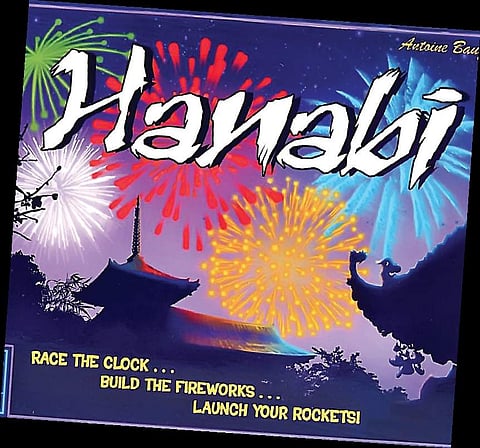

The main reason card games are so popular is because they’re fundamentally based on a secret — what you’re holding in your hand is information that nobody else at the table has access to. That causes a sense of power and mystery, which has given us a number of famous movie scenes over the years. Today, we’re taking a look at an older game called Hanabi that flips the traditional card-game script on its head.
In Hanabi (Japanese for ‘firework’), 2-5 players must work together in order to play cards from their hands in sequence. There are five colours or suits in the game, each containing cards numbered 1 to 5, and you’ve got to take turns playing cards to the centre of the table without any mistakes. A card is only playable if it is the next card in the sequence — for example, the red 1 can only be played if it’s the first red card on the table, and the green 3 requires that the green 1 and 2 (and only those two green cards) were already played previously. Straightforward, right? However, there’s a twist — you can’t see the cards you’re holding.
You’ve got to hold your cards so that everybody else can see them, but you can’t — meaning, of course, that you know what everybody else has in their hand of cards but you don’t have a clue what’s in your own. With one single masterful stroke, Hanabi inverts the card game conventions mentioned earlier and results in everybody around the table looking less like suave high-rollers and more like blindfolded people stumbling around a very dark room — filled with gunpowder.
So, what do you do? You can spend a clue token (a limited resource) to give somebody a single piece of information about their cards. Once you burn through your clues, however, the only way to get them back is to discard a card, removing it from the game and potentially preventing you from progressing in a given colour. So you’ve got to stretch those clues and make them go a long, long way — because you can’t say everything you want to, you’ll be forced to say what you can and hope and pray that your friend can read between the lines. You know exactly how many cards of each type there are in the deck, so the longer the game goes on, the more information you’ll have available to you. Can you make it that far without making three mistakes and ending the game? That’s up to you.
Hanabi is one of my go-to examples when I’m talking to people about the sheer variety and cleverness of modern board games. When you start explaining it, people will seem vaguely nonplussed — what’s the fuss about? Watching their eyes light up once you show them the twist is one of the best things about Hanabi, but the fun doesn’t stop there. It’s a great co-op game — you’ve always got interesting decisions to make, and there’s genuine tension around the table at times. Hanabi won the Spiel des Jahres award in 2013 and, six years later, it’s still bringing a smile to the faces of people trying it out.
Arjun Sukumaran
http://goo.gl/uNBWN3
(Arjun is a gamer, book lover and an all-round renaissance man)